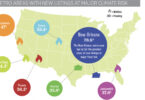Get Smart: As smart technology enters the real estate scene, REALTORS® need knowledge to adequately assist buyers and sellers.
By Megan Craig
What was once a futuristic dream is now a reality: Smart homes are increasingly part of the buying and selling landscape.
In fact, 81 percent of buyers say they’re more likely to buy a home with smart technologies already in place, according to the 2016 Coldwell Banker Real Estate Smart Home Buyer Marketplace Survey.
But what exactly is a “smart home”? That question came up so often among agents that in 2016, Coldwell Banker teamed up with online consumer technology news site CNET to create an official definition:
“A home that is equipped with network-connected products (aka “smart products,” connected via Wi-Fi, Bluetooth or similar protocols) for controlling, automating and optimizing functions such as temperature, lighting, security, safety or entertainment, either remotely by a phone, tablet, computer or a separate system within the home itself.”
The definition also requires a property to have either…
• a smart security feature (like smart locks or cameras), or
• a smart temperature feature (smart thermostat), and
• a reliable internet connection,
…and at least two more smart features:
• lighting
• fire/carbon monoxide detectors
• entertainment systems (such as smart TVs or streaming services)
• appliances
• heating/cooling system, or
• outdoor features (like watering systems)
“It’s not a smart home just because it has a Nest thermostat,” says Angel Piontek, associate broker and creative director at Coldwell Banker Elite in Fredericksburg, Virginia. “This definition shows the bare minimum for what a smart home should be.”
Adding value with smart technology
A home with smart features isn’t automatically worth more money. Instead, smart technology’s value comes from added marketability of the property, says Matthew Rathbun, CRS, a broker with Coldwell Banker Elite who is helping to design the new RRC Smart Home Certification program. Smart technology can act as a differentiator to add a competitive edge to a home that could otherwise blend into the background of a crowded home market.
“I would recommend someone upgrade (to smart technology) because it’s an added benefit,” Piontek says. “When you’re looking at 10 homes that are essentially the same, you’re going to remember the one with the August (Smart) Lock.”
And being able to talk intelligently about such features can set an agent apart, as well, says Chad Curry, managing director of the Center for REALTOR® Technology/CRT Labs at the National Association of REALTORS®.
“It adds value to the relationship to be able to talk to consumers about this because you’re obviously trying to help them augment and improve their quality of life,” Curry says.
That’s a big driver behind the Council’s new training and certification program on smart homes, designed to help agents properly identify smart home characteristics, market the homes correctly and minimize liability surrounding the newest home technologies.
Marketing smart homes for smart consumers
The long-elusive definition of what makes a home truly “smart” has led to issues with false advertising, Rathbun says. Less tech-advanced agents have listed homes as “smart” only to find that the seller kept all of the technology as personal property when they moved.
“One reason agents want to understand it is so they don’t offend people who are serious about smart technology,” he says. And those who know what they’re looking at can point out devices, showing buyers the added-value item.
Rathbun and Piontek have collaborated on videos demonstrating the devices as a way to lead people into the home itself. Such videos would be done, ideally, as a walk-through of the home, Piontek says: “If you do videos, it works to convey your services and show you’re an expert in the market for this niche product.”
But videos aren’t the only way an agent can make his or her knowledge of smart technology known. For example, Rathbun and Piontek also have placed placards on each device inside a smart home to explain what the device is and what it does, as well as any added benefits (like energy cost savings).
“Agents have to think outside the box and do more than they’ll usually do when marketing a smart home,” Piontek says.
Making the transition
For agents, the struggle to define and understand smart home technology creates a second problem, Rathbun says: They aren’t able to help buyers and sellers transition control of smart systems within the home once a sale is final.
“There should be a handoff. The listing agent should have a list and be able to tell the seller how to set the system to factory default,” he says, adding that the turnover of “digital keys” should be included as a contractual obligation in these situations.
It’s easier said than done, especially for less-informed agents, Curry says. In many cases, homes with smart features are sold, and the previous owner still has access to the thermostat or the security system.
For now, he suggests checking out smarthomechecklist.com and doing a walk-through with the seller to find all the devices they’ll leave behind, then emailing the buyer with instructions for resetting each device.
Because each item resets in its own way, the more devices, the more directions required to make the transition complete: “It can be a pretty sticky wicket,” Curry says.
Meet your Designation Maintenance Requirement today! Read this article and “TTFN, FSBO,” take a 10-question quiz and earn 2 credits. Go to CRS.com/trs-quiz to get started.
Waiting for the Law to Catch Up
As in many areas of life, smart home technology is moving faster than the laws governing such technology.
Because smart homes often come equipped with high-tech security features—including audio and video recording devices—interesting legal issues come into play when sellers allow potential buyers into their smart homes.
In many states, prior consent is required before making an audio recording of someone, says Matthew Rathbun, CRS, a broker with Coldwell Banker Elite. That means a homeowner who records potential buyers without warning them that they’re being recorded may be violating federal wiretapping laws.
“More practically, we don’t want sellers listening in because they’re going to get their feelings hurt by anything negative the buyer has to say about the home,” Rathbun says.
On the flip side, potential buyers don’t want to be caught saying anything too kind about the house—“I’d pay anything for that kitchen,” for example.
Rathbun recommends creating a playful sign—along the lines of “Smile! You’re on camera!”—and talking with the seller’s agent to be sure audio recording devices are turned off before any home showings.








